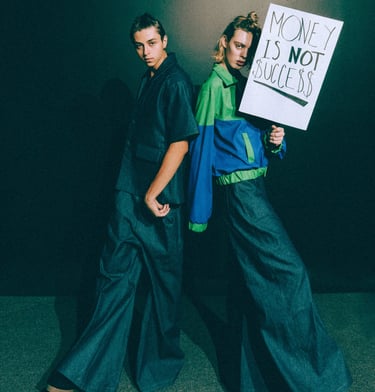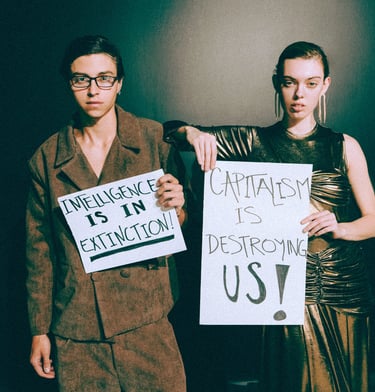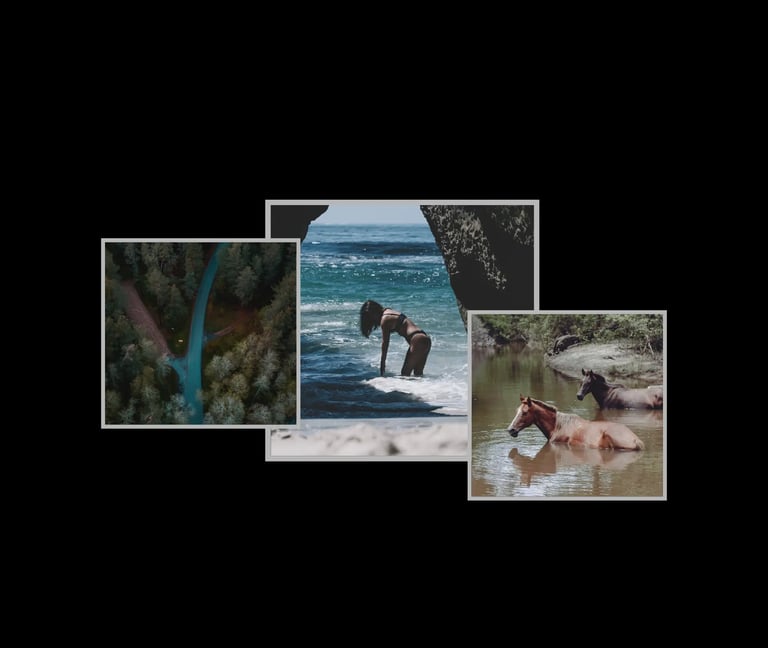Fashion on the Brink: Why Slowing Down Is the Only Way Forward
SUSTAINABILITY


The fast fashion machine is spinning out of control - but a new wave of designers is proving that style doesn’t have to come at the planet’s expense. From Guadalajara to London, from Stella McCartney to VALADEZ, slow fashion is rewriting what success looks like.
The Fast Lane to Nowhere
Fashion is no longer seasonal - it’s perpetual. What once followed the rhythms of spring/summer and autumn/winter has been devoured by an insatiable hunger for the new. Fast fashion giants churn out up to 52 micro-collections a year, while luxury houses tease “pre-fall,” “resort,” and “cruise” lines between traditional shows. The result is an avalanche of clothes that outpaces our capacity to wear, care for, or even desire them.
But speed has consequences. The industry is responsible for around 10% of global carbon emissions, and the World Bank estimates that 20% of all wastewater worldwide comes from textile dyeing. In places like Ghana and Chile, mountains of discarded clothing - many of them worn only once or twice - pile up, poisoning ecosystems and turning landscapes into graveyards of excess.
Meanwhile, at the other end of the supply chain, garment workers - most of them women - continue to earn a fraction of a living wage. The $10 T-shirt, hailed as democratisation, often conceals a story of poverty wages and unsafe working conditions. Rana Plaza, the garment factory in Bangladesh that collapsed in 2013 killing over 1,100 workers, may have shocked the world, but it did not fundamentally change the system.
The problem is structural. The logic of fast fashion - more, faster, cheaper - is incompatible with sustainability. And yet, the industry marches on.
The Call for Slowness
Against this relentless churn, a counter-movement is emerging. Known broadly as slow fashion, it challenges the premise that speed equals success. Instead, it insists that fashion can still inspire, delight, and empower - but only if it is produced responsibly, worn longer, and cherished rather than discarded.
The principles are straightforward:
Quality over quantity. Clothes made to last, not to unravel after three washes.
Transparency and fairness. Workers paid properly, supply chains revealed.
Respect for life. Materials that do not exploit animals or ecosystems.
Culture over commerce. Fashion as storytelling and identity, not just endless consumption.
This philosophy is not new. In many ways, it echoes how fashion once operated: slowly, thoughtfully, with garments valued as heirlooms. What’s new is the urgency - and the growing chorus of designers who refuse to play by the industry’s current rules.
VALADEZ: Fashion with a Manifesto
One of those voices belongs to Juan Luis Valadez, founder of VALADEZ, an independent label based in Guadalajara, Mexico. Trained at Milan’s prestigious Istituto Marangoni and seasoned by nearly two years working in Italy’s fashion capital, Valadez could easily have pursued a conventional career. Instead, he chose a different path - one defined not just by aesthetics but by ethics.
VALADEZ is a “vegetarian brand” - no leather, no fur, no feathers, no silk. This isn’t a marketing gimmick; it’s a stance rooted in compassion. Animals, in Valadez’s world, are not raw materials. His conviction is captured powerfully in his recent campaign, where models hold signs that read:
“Animals are not fabric”
“Money is not success”
“Intelligence is in extinction”
The campaign looks less like an ad and more like a protest. And that’s the point. It forces viewers to confront uncomfortable truths: our definitions of success, our complicity in extinction, our willingness to drape ourselves in the suffering of others.
Yet, for all its activism, VALADEZ remains a true fashion house. The garments - sharp tailoring, fluid silhouettes, confident cuts - bear the refinement of European training and the vibrancy of Latin American creativity. Ethics here are not a limitation; they are an expansion of what fashion can mean.
Crucially, VALADEZ also insists on social responsibility. His manufacturers are paid fairly, their craft respected. Production cycles are slowed deliberately to allow for care, not speed. In doing so, he rejects the toxic race to the bottom that dominates fast fashion. For this, the brand has earned a place on the Green List, Thrive Century's directory of ethical and sustainable brands.




A Global Movement
VALADEZ is part of a larger constellation of brands proving that fashion does not have to exploit. Stella McCartney has long been a pioneer, proving luxury and leather are not synonymous. In Ghana, Studio One Eighty Nine, co-founded by Rosario Dawson and Abrima Erwiah, uses traditional African textiles to produce collections with community empowerment at their core. In India, designers are rediscovering handloom weaving, offering alternatives to industrial fabric. Across Europe and the Americas, upcycled and recycled materials are moving from niche to mainstream.
The common thread is a refusal to accept “business as usual.” These brands show that sustainability is not about sacrifice but about imagination: the creativity to design not just clothes, but systems that honor workers, culture, and the planet.
Why Consumers Hold the Key
Still, the truth is sobering: slow fashion cannot succeed without slow consumption. Designers can resist, but the cycle persists because consumers keep feeding it. We want more. We want new. We want cheap.
To shift this, we need to embrace a radical idea: buy less. Wear what we already own. Mend it. Swap it. Treasure it. When we do buy, choose better: support brands that pay fair wages, that use sustainable materials, that take a stand - brands like VALADEZ.
This isn’t about guilt. It’s about power. Every purchase is a vote. Do we vote for the endless churn of exploitation, or for a system that respects life in all its forms?
Redefining Success
Perhaps the most radical message of the VALADEZ campaign is also the simplest: “Money is not success.”
In today’s fashion landscape, dominated by billion-dollar IPOs and influencer-driven sales, this is heresy. Yet it might be the only definition that makes sense. True success in fashion cannot be measured by units sold or margins won, but by integrity maintained. By craft preserved. By ecosystems spared. By dignity upheld.
Fashion has always been a mirror of culture. Right now, that mirror reflects overconsumption, waste, and exploitation. But if we slow down - if we listen to the voices calling for change - it could reflect something else: intelligence, responsibility, beauty rooted in respect.
And maybe, just maybe, that’s what real style looks like.


